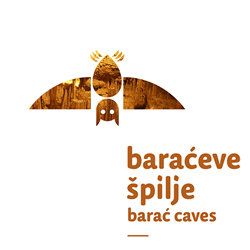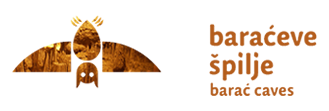-
VISIT WALKING TRAILS
of the Protected Landscape of Barać Caves
ABOUT TRAILS
There are three circular hiking trails available, starting and ending at the Barać Caves picnic area. They are named after the protected large animals that inhabit the area of Protected landscape - wolf, lynx, and bear. Accordingly, special markings have been created - wolf paw, lynx paw, and bear paw!
The shortest trail, suitable for beginners. It's a convenient option for a short walk while, for example, waiting to visit the Upper Barać Cave.
Length: 1,2 km
Duration: 20-30 minutes
GPX route file: Vučja staza
Marking: Orange paw
A medium-length trail ideal for a pleasant family walk.
Length: 3,1 km
Duration: 1:00-1:30 h
GPX route file: Lynx trail
Marking: Blue paw
The longest trail for adventurous hikers. It conceals the most beautiful viewpoints, forest springs, streams, and numerous caves.
Length: 7,5 km
Duration: 3 - 4 h
GPX route file: Medvjeđa staza
Marking: Red paw
Download the map of walking trails: Walking Trails Map
Walking trails are available and free for all visitors. However, if you choose to explore the trails with a professional guide, the service is charged according to the current price list. To book the guided tour service for the Lynx Trail, it is necessary to make a written reservation via email.
| VOĐENA ŠETNJA | IZNOS S PDV-OM |
|---|---|
| GRUPA DO 50 OSOBA | 55,00 € |
IMPORTANT INFO
Check the weather conditions
No signal in some parts of the forest
Choose a trail according to your fitness level
Be aware of the wild animals inhabiting the forest
Bring adequate footwear and clothing
Bring water supplies
Don't forget to bring any necessary medications
We do not recommend going to the forest alone
-
The trails pass through a larger complex of mixed deciduous forest and partly through dry and semi-dry grasslands, which represent important habitats for numerous rare and endangered plant and animal species. Due to the use of the trails, the grasslands will be regularly mowed, thus preserving valuable habitats, which is one of the main goals of managing the Protected landscape of Barać Caves.
RECOMMENDATIONS FOR POTENTIAL WILDLIFE ENCOUNTERS
Make louder noises while moving
Avoid staying in the woods late in the evening, at night or early in the morning
Follow the marked trails
Animals feel threatened when they are startled. Make louder noises while moving and converse loudly to alert them to your presence. They are bound to get out of your way long before you approach them. This way, you will safely rule out unwanted encounters with wild beasts. Avoid staying in the woods late in the evening, at night or early in the morning, when the animals are most active, which is especially true for the mating season in the months of May and June. Follow the marked trails and paths through the forest. If you spot an animal, don’t try to approach it. This particularly applies if you encounter them on their feeding grounds. Meeting a female leading young can be especially dangerous. If you see such a family in time, try to walk away imperceptibly the way you came. Never approach young animals, and do not try to catch them by any means. The female will surely attack if she feels that her young are in danger. Young orphan bears who lost their mothers early can be dangerous. These bears are not afraid of humans and are therefore potentially dangerous.
Do not take your dog to a bear habitat. While running away from a bear, your pet will lead the bear straight to you. If you encounter a bear up close, try to keep calm and cool and don’t run away. If a bear is leaning on its hind legs, this does not mean it is preparing to attack - it just wants to get a better look at you because its vision is less developed. Avoid any actions that could make the bear feel threatened (throwing stones, yelling…) as there is a high probability that it will attack you. Give the bear room to retreat. If it’s impossible to avoid a bear attack, do not tackle the bear by any means. Throw yourself on the ground on your stomach and protect your head with your arms crossed. And once again, remember: Animals feel threatened when they are startled. Make louder noises while moving and converse loudly to alert them to your presence. They are bound to get out of your way long before you approach them. This way, you will safely rule out unwanted encounters with wild beasts.

